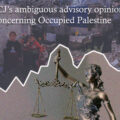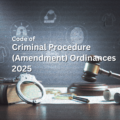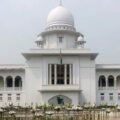This edition of ‘From the Court Corridor’ curates the notable pronouncements of the Appellate Division (AD) and the High Court Division (HCD) of the Supreme Court (SC) of Bangladesh in February 2023.
HCD Sets Precedent: Marital Status No Longer a Requirement in Admission Forms, Upholding Privacy and Equality
In a landmark decision on 16 February 2023, the HCD ruled that educational institutions are no longer allowed to demand admission seekers to disclose their marital status. The ruling was delivered by a bench comprising Justice Naima Haider and Justice Md Khairul Alam following a hearing on a rule presented in December 2017 questioning the legality of such inquiries by educational institutions.
The verdict stemmed from an issue arising from Rajshahi Government Nursing College demanding a rape victim to state that she was abandoned by her husband in her admission form when, in fact, she was unmarried. The girl was unable to fill out the admission form due to her marital status, as she was not married and had a child due to being a victim of the incident. SC lawyers Fahria Ferdous and Nahid Sultana Jenny filed a writ petition on 11 December 2017, which led to the decision. The petition was prompted by a report published on 14 November 2017, in a Bangla daily titled “Meyeti akhon ki korbe?”
The court, presided over by Justice Quazi Reza-ul Hoque and Justice Mohammad Ullah, issued a rule requiring the government to explain the constitutionality of asking about marital status in the admission process.
Barrister Aneeq R Haque participated in the hearing on behalf of the writ petitioners, while Deputy Attorney General Amit Das Gupta represented the state. According to Amit Das Gupta, no student may be required to disclose their marital status for admission purposes anywhere in the nation.
Moreover, the HCD deemed the actions of Rajshahi Government Nursing College illegal and directed the authorities of the institution to admit the petitioner in question. This decision was made after the final hearing on the rule, in which the HCD bench declared the rule absolute.
This ruling is a significant step in protecting women’s rights and privacy in educational institutions across the nation, in line with our country’s constitution. Part III of the constitution outlines fundamental rights, and Articles 27, 28(2), 28(4), 29(2), etc, make it clear that women must have equal opportunities in all civil and political matters, including the right to education, regardless of their marital status. The ruling prohibits educational institutions from compelling admission seekers to disclose their marital status, promoting an inclusive environment that supports and empowers rape survivors. This decision not only addressed the hostile circumstances faced by rape victims but also called for transformative societal change in Bangladesh.
It challenged deeply ingrained biases, stereotypes, and social taboos that perpetuate the mistreatment of rape victims. This rule truly serves as a call for all stakeholders to work together to create a society that prioritizes the rights and dignity of survivors and ensures they receive the compassion, justice, and support they deserve.
SC Advances Accessibility: Translation of Rulings Empowers Litigants and Enhances Language Inclusivity
On 21 February 2023, Chief Justice Hasan Foez Siddique announced a ground-breaking initiative to translate all rulings published by the SC into Bengali. This significant announcement follows the integration of new technology on the SC website, allowing litigants to effortlessly translate and comprehend judgments with a single click.
Launched on 20 February 2023, the service enables lawyers, litigants, and the public to access English judgments and efficiently translate them into Bengali using Google’s assistance on the Bangladesh SC website. The Chief Justice emphasized on the ongoing efforts to ensure accurate translations of existing judgments.
Judges are increasingly issuing rulings and orders in Bengali as the SC promotes the use of the state language. To further aid litigants’ understanding, original English judgments from both the Appellate Division and the HCD are being translated into Bengali. The SC’s Translation Cell is in charge of this initiative and is using a software named “Amar Vasha”. This software uses Artificial Intelligence and has proven highly effective, enabling the translation team, consisting of a dedicated five-member group, to successfully translate approximately 200 verdicts.
The legal reliance on Bengali dates back to the late Justice ARM Amirul Islam Chowdhury’s initiative during the 1900s, with subsequent judges like Kazi Ebadul Hoque, Hamidul Haque, Abdul Quddus, ABM Khairul Haque, and AHM Shamsuddin Chowdhury Manik delivering judgments in Bengali.
Highlighting the dedication to utilizing the state language, Appellate Division Judge Justice M Enayetur Rahim, during his tenure as an HCD judge, issued an astounding 15,000 judgments and orders in Bengali.
Furthermore, on 1 February, the AD Chamber Court Judge delivered all orders in Bengali, announcing his commitment to delivering all future judgments and orders in the state language.
Former law minister Barrister Shafique Ahmed emphasized the need for careful implementation and transition to ensure seamless integration, recognizing the complexity of introducing Bengali to the SC. Former Chief Justice ABM Khairul Haque also praised translating English orders into Bengali but cautioned against using them as references for future cases, as the translations occasionally could omit crucial content from the original judgment.
This initiative by the SC to translate orders and judgments into the state language represents a significant step towards enhanced accessibility and language inclusivity.
This initiative to translate all rulings into Bengali facilitates accessibility in several ways. Litigants who may not be proficient in English can now access and understand the judgments related to their cases without relying on others for translations. This empowers them to be more informed about their legal matters and make better decisions.
Lawyers and legal professionals who are more comfortable with Bengali as their primary language also benefit from this translation service. It aids them in conducting legal research, preparing cases, and presenting arguments effectively in the courts.
The general public, including students, academics, and researchers, who wish to study and understand legal precedents and judgments can now access this information in Bengali. This democratizes legal knowledge and promotes legal awareness in society.
The language inclusivity achieved through this initiative also aligns with the national and cultural values of Bangladesh, as Bengali is the official state language. By prioritizing translations and encouraging the use of Bengali, the judiciary reinforces its commitment to facilitating justice for all, regardless of linguistic barriers, and upholds the importance of the Bengali language in the country’s legal landscape.
Overall, this move promotes transparency, inclusivity, and a more accessible legal system, thereby enhancing the overall understanding and participation of citizens in the legal process in Bangladesh.
HCD Urges Protection of Open Spaces: Order to Remove Posters and Graffiti from Dhaka Flyovers
On 6 February 2023, the HCD issued a notable judgment mandating the two city corporations of Dhaka to remove all graffiti and posters from all flyovers in the capital within two weeks. The HCD bench, comprising Justice Farah Mahbub and Justice Ahmed Sohel, made this judgment after hearing a writ petition filed in the public interest. Senior lawyer Manzil Murshid filed the petition on behalf of Human Rights and Peace for Bangladesh (HRPB).
The writ petition sought HCD directions to establish a monitoring team to control the placement of posters and wall writing on flyovers and to enforce the implementation of the Graffiti Writing and Poster Sticking Control Act of 2012, which strictly prohibits these items except in designated areas.
In addition to the removal, the court has emphasized on requiring a monitoring team to regulate flyover posters and graffiti pasting. A rule has been issued requesting explanations from government officials for their inaction in removing these materials, which could lead to their inaction being declared illegal.
The Local Government and Rural Development Secretary, the mayors of the two Dhaka City Corporations, the chairman of Rajdhani Unnayan Kartripakkha (Rajuk), and the Inspector General of Police (IGP) have been given four weeks to respond to the rule. Advocate Manzil Murshid represented the writ in court on behalf of Human Rights and Peace for Bangladesh (HRPB), which filed the petition seeking HCD directives to remove graffiti and posters from the capital’s flyovers, citing their detrimental impact on the aesthetics of these structures.
The HCD emphasized that every citizen has the right to open spaces and expressed deep concern over the presence of posters on various structures, including flyovers in Dhaka. In response to the writ petition, the HCD bench ordered the authorities responsible for the seven flyovers in Dhaka to remove all graffiti and posters from their walls within two weeks.
The court further directed the authorities to take appropriate legal action against individuals involved in these activities and mandated the formation of a monitoring committee within a week. The authorities have been given four weeks to submit a report documenting their compliance with these directives.
This significant ruling by the HCD reinforces the importance of preserving open spaces and aesthetics within the city. Firstly, open spaces contribute to the well-being of citizens by providing areas for recreation, relaxation, and social gatherings. Removing graffiti and posters from flyovers helps maintain these spaces’ cleanliness and visual appeal, enhancing the overall quality of life for residents.
Secondly, preserving aesthetics in public structures like flyovers contributes to the city’s image and identity. A cleaner and more visually pleasing urban environment can positively impact tourism and attract investment, promoting economic growth.
Additionally, the court’s emphasis on removing graffiti and posters aligns with the enforcement of the Graffiti Writing and Poster Sticking Control Act of 2012, promoting the rule of law and ensuring that public spaces are used appropriately and in accordance with the law.
Moreover, the ruling highlights the importance of respecting public infrastructure. Flyovers are essential for urban mobility, and their defacement with graffiti and posters can compromise their structural integrity and safety. Ensuring proper maintenance of these structures is vital for the safety of commuters and the overall functionality of the city’s transportation network.
The HCD’s ruling underscores the significance of safeguarding open spaces, upholding aesthetics, adhering to laws, and valuing public infrastructure for the well-being, identity, and progress of the city and its residents. By addressing the issue of posters and graffiti on flyovers, the court aims to maintain the beauty and integrity of public structures while ensuring a pleasant environment for the citizens of Dhaka.
HCD Measures to Control Air Pollution in Dhaka: Order for Eviction of Illegal Brick Kilns
On 27 February 2023, the HCD took a strong stance against air pollution in Dhaka, issuing an urgent order to the Department of Environment (DoE) to take immediate action to remove all illegal brick kilns in Dhaka, Gazipur, Narayanganj, Manikganj, and Munshiganj districts within a two-week timeframe. The order was delivered by a bench consisting of Justice K M Kamrul Kader and Justice Mohammad Ali, following a thorough review of reports submitted by the DoE, the two City Corporations of Dhaka, and the Inspector General of Police regarding air pollution prevention.
The HCD initially addressed air pollution in Dhaka on 13 January 2020, following a writ petition by Human Rights and Peace for Bangladesh. The petition sought necessary orders from the HCD to address air pollution. The writ petitioner’s attorney, Lawyer Manzill Murshid expressed concerns over the lack of action taken by the authorities to curb air pollution, leading to an additional application requesting the implementation of the court’s orders.
The court gave a comprehensive nine-point directive to combat the issue. The directive aimed to control vehicle emissions, establish economic lifespans of vehicles as per the Road Transport Act, 2018, prohibit vehicles with no economic life, and prohibit unauthorized tire burning and battery recycling. It also mandated proper garbage disposal, water spraying, and covering trucks carrying sand, mud, or waste.
The HCD further addressed the issue of illegal garbage dumping in the surrounding districts and requested a compliance report from the Department of Environment. The court had previously ordered a report to be submitted by February 5, following its directives on dealing with air pollution.
During the court hearing, Manzil Murshid emphasized on the previous directive from the HCD from February 5, which required the implementation of air pollution control measures within two weeks and the submission of follow-up reports. However, the court expressed disappointment upon reviewing the reports, as they failed to adequately implement the court’s instructions. Consequently, the HCD has extended a two-week deadline and directed all parties to fully implement the instructions and submit further reports accordingly.
The HCD has affirmed its commitment to combating air pollution in Dhaka, highlighting the urgency of taking immediate action to safeguard the environment and general welfare. The ruling calls for immediate measures, long-term solutions, public awareness campaigns, and investments in sustainable practices. It urges industries and construction companies to adopt sustainable practices and invest in technologies to minimize pollution.
Protecting the environment, especially its air is crucial for various reasons. It ensures public health by preventing health issues caused by pollution and hazardous substances. It preserves biodiversity, safeguarding diverse flora and fauna and maintaining ecological balance. Environmental protection is essential for sustainable development, ensuring resources for future generations. Moreover, it helps Bangladesh adapt to climate change and mitigate risks. A clean environment attracts investment, boosts tourism, and improves citizens’ quality of life, promoting economic growth. It fulfils Bangladesh’s global responsibility to combat climate change and environmental degradation in line with international commitments.
In the context of Bangladeshi environmental law, there are several regulations and laws aimed at keeping the environment clean and protecting it for the well-being of the present and future generations.
The Environment Conservation Act, 1995 serves as the cornerstone of environmental protection in Bangladesh. It empowers the government to take necessary measures to conserve, protect, and improve the environment, including air quality.
Under the Environmental Impact Assessment (EIA) Regulations, 1997, projects that may have significant environmental impacts must undergo an EIA process before approval. This helps identify potential environmental risks and mitigative measures.
The Bangladesh National Building Code (BNBC) sets standards for construction practices to ensure sustainable development and environmental safety.
The Air Pollution Control Act, 2004 addresses air pollution by imposing emission standards and controls on industries and vehicles.
All stakeholders, including government bodies, private sector entities, and citizens, must work together to create cleaner air and a healthier environment for future generations confirming to the existing laws protecting the environment. By prioritizing environmental protection and taking swift action against air pollution, Dhaka can set an example for other cities facing similar challenges worldwide.
















